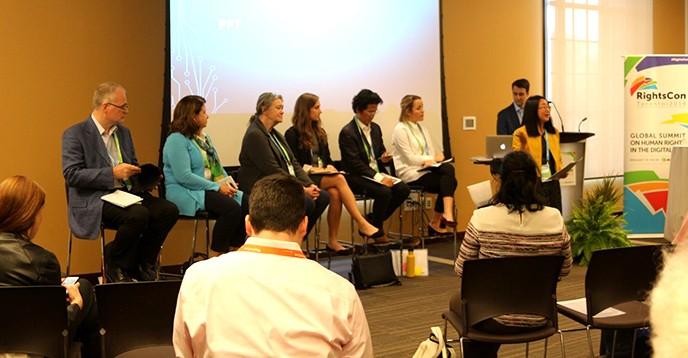news_010618_rights_con.jpg

UNESCO discusses challenges and future of multistakeholder Internet governance during RightsCon 2018.
The inequality between global North and global South participation in Internet governance discussions is a significant challenge to the evolution of a balanced and equal approach to digital policymaking. It is crucial that all stakeholders from all regions have equal participation opportunities,” was the key message from UNESCO’s session held during RightsCon 2018 in Toronto, Canada.
To debate on the challenges and future of multistakeholder Internet governance as well as policy recommendations, UNESCO and ICANN’s Non-Commercial Users Constituency (NCUC) jointly organized a session at RightsCon, the world’s leading conference on human rights in the digital age, 16 May 2018.
Xianhong Hu from UNESCO and Michael Karanicolas from ICANN’s Non-Commercial Users Constituency introduced the session by presenting different multistakeholder models to the participants and by sharing UNESCO’s and ICANN’s experiences and works on the subject. “Internet governance powered by the principle of multistakeholderism should not be the prerogative of a single institutional actor. Instead, we have to recognize the collective involvement of different and complementary roles and duties for different actors,” said Xianhong Hu before giving the floor to the speakers.
“A major challenge to the multistakeholder approach is the inequality we see in its structures – not only in terms of some stakeholder groups, but also in discrepancies between global North and South participation,” said Anri van der Spuy from Research ICT Africa and author of UNESCO’s publication What if we all governed the Internet? Concerning the deepening inequalities as well as the shrinking spaces for civil society, Anri van der Spuy added that “a priority is to find better ways to engage marginalized communities, or they will again be excluded and inequalities will be further entrenched.”
Matthew Shears, board member of ICANN, emphasized the multi-dimensional nature of the multistakeholder approach. “Challenges faced by multistakeholder participation is more a reflection of the challenges and uncertainties that are faced by Internet governance in general,” Matthew Shears said. He concluded his remarks by saying that “the expertise of participants is more important than the number of people who are engaging in the processes. But, to avoid capture, it is important that all stakeholders can participate on an equal footing”.
“It is important to ensure that multistakeholder approaches are implemented at national but also at local levels,” said Katie Watson from the Internet Society. Katie Watson then talked about ISOC’s collaboration with the Canadian government on issues related to the Internet of Things as a good multistakeholder practice. “This kind of best practices could effectively convince people of the benefits of multistakeholder approaches,” she concluded.
“Sometimes, the extreme complexity of issues in Internet governance make it difficult to use multistakeholder approaches,” stressed Stephanie Perrin from ICANN’s NCUC. “Civil society needs to better collaborate in order to ensure that it can respond better and thus be more effective in influencing policymaking.” Susan Kawaguchi, also from ICANN NCUC, indicated that involving smaller groups in the process might be an answer to the problems created by those approaches. She also mentioned the important role of newcomers in adopting multistakeholder approaches.
Kyung-Sin Park from Open Net Korea welcomed the application of multistakeholder models, giving the example of the South Korean case. Meanwhile, he mentioned that “the risk of capture in global South is bigger than in the North, therefore it is important to ensure that all stakeholders from all regions have equal participation opportunity.”
Xianhong Hu and Michael Karanicolas concluded the session by welcoming the participation of many new stakeholders who had not heard of multistakeholder participation in Internet governance before. They also invited them to follow UNESCO’s and ICANN’s work on the subject.
